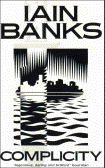
Publisher: Abacus (1994)
ISBN: 0 349 10571 5
Précis: n.1. the fact of being an accomplice, esp. in a criminal act
A few spliffs, a spot of mild S&M, phone through the copy for tomorrow's front page, catch up with the latest from your mystery source - could be big, could be very big - in fact, just a regular day at the office for free-wheeling, substance-abusing Cameron Colley, a fully-paid-up Gonzo hack on an Edinburgh newspaper.
The source is pretty thin, but Cameron senses a scoop and checks out a series of bizarre deaths from a few years ago - only to find that the police are checking out a series of bizarre deaths that are happening right now. And Cameron just might know more about it than he'd care to admit...
Summary: Returning from covering the docking of a british nuclear submarine Cameron, receiving another anonymous phone call from his pseudo-nominous Mr Archer, speeds off to the appointed rendezvous place to get the next tip in a fairly bizarre set of clues he has been given. Exactly what the clues point to, and why Mr Archer is telling him them hasn't yet been understood by Cameron but he feels sure there is a big scoop in it all.
So, feeling chirpy, Cameron files his report and nips off to lunch with his married lover Yvonne and her husband. Expecting to be a lone with Yvonne for some quick sex he finds this lunch a rather frustrating and drawn out affair. Someone, however, is taking their frustrations out in a fairly direct manner - begining with a murder. Slipping away from the crime scene they disappear again into the story, not be seen for a chapter or two.
Cameron is deeper into trouble though. It seems out mystery assailant has been using IRA verification codes that only a few classes of people know, journalists among that number. Increasingly nervous and questioned again by the police Cameron then ends up being arrested when one of his anonymous calls places him in the area of the latest attack by the unknown asssailant. The police begin working on his story fulltime and find he has no good alibis for any of the attacks, murders and sundry assaults that are being investigated.
To make matters worse a shopping list on a note is found near one of the crime scenes, written in his handwriting. Holding him in captivity the majority of the officers working on the case think Cameron is their man and are working hard on establishing it. A wrinkle occurs when another murder is committed while Cameron is locked up in a cell. Cameron, prompted by the police, begins to see a trend in the murders and suspects a long time friend (recently thought dead) is responsible.
Setting a trap at this friends alledged funeral the police almost catch him and the finger of suspicion is entirely lifted off Cameron. However now he has to help the police try and catch his friend. With two more muders committed the chase proves frustrating for police and Cameron alike. Attending the funeral of a third recent victim Cameron is captured and taken to a semi-remote island, where justifications are given and Cameron is given a choice and chance to redeem himself in his own eyes.
Comments: Not a book for the faint of heart or even mildly squeamish. If you read 'The Wasp Factory' and found it distasteful then this book will be abhorrent to you. It takes full advantage of Iain's talent for depicting violence in a fluid and captivating style. But don't think the violence is gratuitous.
The book is a strong comentary on modern day life, especially modern day UK life, although the message of the story applies equally well virtually anywhere in the first world countries. Iain, in interview, described the book as one long scream and that is a fairly apt description. It is a long tortured scream about modern society and our complicity in it's shape and make up.
It also has that cynical and dark brand of humour that Iain is famous for, much more cynical than the fairly pleasant preceeding tale of 'The Crow Road'. As such I love the book, a mix of the serious, not so serious and the grisly all wrapped up in social commentary is something I find hard to resist. It is part of what attracts me to his Culture novels and, like the Culture Novels, the title is a cypher to the levels of meaning present in the book.
Where it falls slightly short is in complexity. Compared to the byzantine ways of 'The Bridge' or 'Use of Weapons' it is a fairly linear tale with only the odd flashback memory to disrupt the narrative flow. Still, while I detract a little from the novel for it's simpler style it is hard to see how the complexity of the tale could have been improved and still tell a good story.
Anyhow, this is one to hunt down and read - assuming you can stand a few rather explicit descriptions of violent acts.